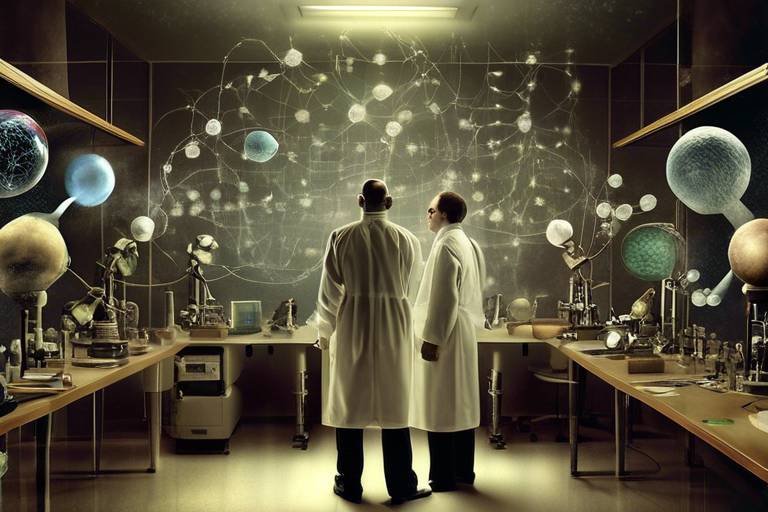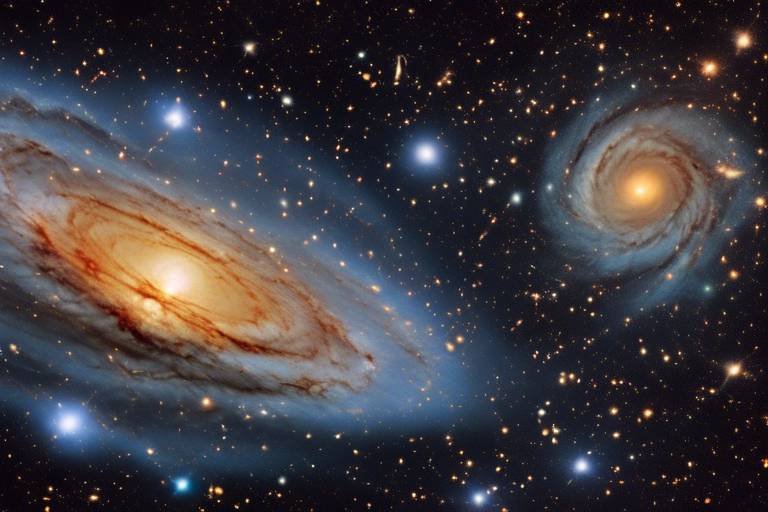In Search of a Theory of Everything - The Roles of Philosophy and Science
Have you ever gazed up at the stars and pondered the mysteries of the universe? The quest for a theory of everything is not just a scientific endeavor; it's a profound journey that intertwines philosophy and science. These two realms, often perceived as distinct, actually dance together in a complex relationship, each influencing and shaping the other. As we embark on this exploration, we will uncover how philosophical thought lays the groundwork for scientific inquiry and how scientific discoveries can, in turn, challenge and refine our philosophical understandings.
The search for a unified theory is akin to piecing together a massive jigsaw puzzle, where each piece represents a different aspect of reality. Philosophy provides the guiding principles that help us determine which pieces fit together and how they relate to the bigger picture. Without this philosophical framework, scientific endeavors might lack direction, leading to fragmented knowledge rather than a cohesive understanding of the universe.
In our journey, we will delve into the philosophical foundations that underpin scientific methodologies, exploring how concepts like empiricism and rationalism shape the way we approach knowledge. We will also examine the scientific method, a systematic approach that allows us to test hypotheses and validate theories. This method is not just a list of steps; it's a dynamic process that reflects the ongoing dialogue between philosophy and science.
Moreover, we will confront the limitations of science, recognizing that while it offers powerful tools for understanding the natural world, there are questions it may never fully answer. This acknowledgment opens the door for philosophical inquiry, prompting us to explore the deeper meanings of existence and reality that science alone cannot illuminate.
As we navigate this intricate landscape, we will also consider the ethical dimensions of scientific research, highlighting how philosophical principles guide our moral compass in the pursuit of knowledge. Ultimately, the interplay between philosophy and science enriches our understanding of the universe, leading us closer to that elusive theory of everything.
Philosophy serves as the bedrock upon which the edifice of science is built. It provides the essential framework that informs scientific inquiry, shaping our understanding of concepts such as causality, truth, and knowledge. These philosophical underpinnings influence how scientists formulate questions, design experiments, and interpret results. For instance, the principle of falsifiability, introduced by philosopher Karl Popper, asserts that for a theory to be scientific, it must be testable and capable of being proven false. This concept has shaped the way scientists approach their work, emphasizing the importance of rigorous testing and skepticism.
Furthermore, philosophical discussions about the nature of reality and existence inform scientific paradigms. For example, the debate between realism and anti-realism regarding scientific theories raises fundamental questions about whether scientific models accurately depict the world or are merely useful tools for prediction. Such discussions encourage scientists to reflect on the implications of their work and the extent to which their theories can claim to represent reality.
The scientific method is a systematic approach to inquiry that has revolutionized our understanding of the natural world. It comprises several key steps:
- Observation: Noticing phenomena and gathering data.
- Hypothesis Formation: Proposing explanations for the observed phenomena.
- Experimentation: Testing hypotheses through controlled experiments.
- Analysis: Interpreting data and drawing conclusions.
- Peer Review: Subjecting findings to scrutiny by other experts.
This method is crucial for developing and validating theories, including the highly sought-after theory of everything. Each step in the scientific method is interconnected, reflecting a continuous cycle of inquiry that drives scientific progress.
At the heart of scientific advancement lies the formulation of hypotheses. These educated guesses serve as the starting point for investigation, guiding researchers toward discoveries. A well-constructed hypothesis not only proposes a potential explanation but also provides a framework for testing and validation. Think of a hypothesis as a compass, helping scientists navigate the vast landscape of knowledge.
Once a hypothesis is established, it undergoes rigorous testing. This process is vital for establishing scientific credibility. Various methods of validation, such as controlled experiments and observational studies, ensure that findings are reliable and reproducible. The importance of reproducibility cannot be overstated; it is the bedrock of scientific integrity, allowing others to verify results and build upon previous work.
Peer review functions as a quality control mechanism within the scientific community. By subjecting research to the scrutiny of experts in the field, peer review helps ensure that only robust and credible findings make it into the scientific literature. This collaborative process fosters an environment of accountability and continuous improvement, essential for the development of sound scientific theories.
Despite its remarkable achievements, science has its limitations. There are profound questions regarding existence, consciousness, and morality that may elude scientific inquiry. These limitations invite philosophical exploration, encouraging us to ponder the nature of reality and the human experience. In this way, philosophy and science complement each other, each addressing aspects of understanding that the other may overlook.
Philosophy enriches our understanding of reality in ways that science alone cannot. Through rigorous examination of concepts like metaphysics and epistemology, philosophy encourages us to question the nature of existence and the sources of our knowledge. This exploration is essential for forming a comprehensive view of reality, as it challenges us to consider the implications of scientific findings within a broader philosophical context.
Metaphysics, the study of the fundamental nature of reality, and epistemology, the study of knowledge, are central to philosophical inquiry. Together, they provide a framework for understanding the universe and our place within it. By examining the underlying assumptions of scientific theories, philosophy helps us navigate the complexities of existence and knowledge, complementing scientific perspectives.
Ethical considerations are paramount in scientific endeavors. Philosophy plays a critical role in guiding ethical practices within research, ensuring that the pursuit of knowledge is conducted responsibly. Questions about the implications of scientific advancements—such as genetic engineering, artificial intelligence, and environmental impact—demand careful ethical scrutiny. By integrating philosophical thought into scientific practice, we can navigate these challenges with integrity and foresight.
- What is a theory of everything? A theory of everything aims to unify all fundamental forces and particles in the universe into a single theoretical framework.
- How do philosophy and science interact? Philosophy provides foundational principles that guide scientific inquiry, while scientific discoveries can challenge and refine philosophical concepts.
- What are the limitations of science? Science may not answer questions about meaning, existence, or morality, which are often explored through philosophy.
- Why is peer review important? Peer review ensures the credibility and reliability of scientific research by subjecting findings to scrutiny by experts in the field.

The Philosophical Foundations of Science
Philosophy serves as the bedrock upon which the edifice of science is constructed. It is not merely an abstract discipline; rather, it provides the essential frameworks and principles that guide scientific inquiry. When we delve deep into the essence of scientific methodologies, we discover that philosophical concepts shape how we approach questions about the universe. Think of philosophy as the compass that directs scientists through the vast ocean of knowledge, helping them navigate the complexities of empirical data and theoretical constructs.
At its core, the relationship between philosophy and science is symbiotic. Philosophy asks the fundamental questions: What is knowledge? How do we know what we know? These inquiries lead to the formulation of hypotheses and theories that scientists test and validate. For instance, the principle of falsifiability, proposed by philosopher Karl Popper, posits that for a theory to be considered scientific, it must be testable and refutable. This idea has profoundly influenced how scientists approach their work, emphasizing the importance of rigorous testing and open-mindedness in the face of new evidence.
Moreover, philosophical discussions about causality, determinism, and the nature of reality itself have significant implications for scientific exploration. Understanding the difference between correlation and causation, for example, is crucial for scientists when interpreting data. Without a philosophical grounding, one might easily fall into the trap of assuming that just because two events occur together, one must cause the other. This is where philosophy acts as a protective barrier against misinterpretation, ensuring that scientific conclusions are drawn from a solid foundation of reasoning.
In addition to shaping methodologies, philosophy also influences the ethical dimensions of scientific research. Questions about what constitutes responsible experimentation, the treatment of human and animal subjects, and the implications of scientific discoveries for society are all deeply philosophical in nature. The ethical frameworks that guide scientists in their work often stem from philosophical theories, highlighting the ongoing dialogue between these two fields. As we continue to explore the universe and push the boundaries of knowledge, it becomes increasingly clear that philosophy is not just an accessory to science; it is an integral part of the scientific enterprise.
In summary, the philosophical foundations of science are essential for understanding not only how we conduct research but also how we interpret the findings. The interplay between these two disciplines enriches our quest for knowledge and helps us grapple with the profound questions about existence and reality. As we move forward in our exploration of the universe, let us remember that philosophy and science are partners in this journey, each contributing unique insights that propel us toward a more comprehensive understanding of everything.

The Scientific Method Explained
The scientific method is like a roadmap for discovery, guiding researchers through the labyrinth of questions and hypotheses. It's a systematic approach that helps us peel back the layers of the universe, revealing the intricate workings of nature. But what exactly does this method entail? At its core, the scientific method comprises a series of steps designed to ensure that our quest for knowledge is rigorous and reliable. Think of it as a recipe: without the right ingredients and steps, the outcome can be unpredictable.
To grasp the significance of the scientific method, let’s break down its essential components:
- Observation: Everything begins with observation. Scientists notice something intriguing in the world around them, which sparks curiosity and leads to questions.
- Question: From observations, specific questions arise. For instance, “Why does the sky appear blue?” This question is the gateway to deeper exploration.
- Hypothesis: Next comes the hypothesis—a proposed explanation for the observed phenomenon. It’s like making an educated guess that can be tested.
- Experimentation: This is where the magic happens. Scientists design experiments to test their hypotheses, collecting data and evidence to support or refute their ideas.
- Analysis: After gathering data, the next step is analysis. Here, scientists sift through their findings, looking for patterns or inconsistencies.
- Conclusion: Finally, scientists draw conclusions based on their analysis. Did the data support the hypothesis? If not, it’s back to the drawing board!
Each of these steps is crucial, and skipping one can lead to flawed conclusions. For example, if a hypothesis isn't clearly defined, the entire experiment might miss the mark, leading to confusing results. In this way, the scientific method acts as a safeguard, ensuring that our explorations are grounded in evidence and logic.
Hypothesis formation is the heartbeat of the scientific method. It’s where creativity meets analytical thinking. A good hypothesis isn't just a wild guess; it’s a testable statement that provides a direction for research. Imagine you’re a detective trying to solve a mystery. Your hypothesis is like a theory about who the culprit might be. It guides your investigation, helping you focus on relevant evidence. In the quest for a theory of everything, forming hypotheses about the fundamental forces of nature or the origins of the universe is essential.
Once a hypothesis is formulated, it’s time for testing and validation. This is akin to putting your theory through a rigorous workout to see if it holds up under pressure. Scientists employ various methods to validate their hypotheses, including controlled experiments, observational studies, and simulations. The goal is to gather reproducible results that can be independently verified by other researchers. This reproducibility is the bedrock of scientific credibility. If your findings can't be replicated, they might as well be whispers in the wind.
Peer review is another critical aspect of the scientific process. It acts as a quality control mechanism, where fellow scientists evaluate research before it’s published. This process ensures that findings are scrutinized for accuracy, methodology, and significance. Think of peer review as a rigorous exam that every scientific paper must pass before it can be considered credible. It helps filter out flawed studies, allowing only the most robust theories to emerge. In the realm of scientific inquiry, peer review is akin to a trusted friend who offers constructive criticism, helping to refine and strengthen your ideas.
In summary, the scientific method is an indispensable tool in the journey toward understanding the universe. By adhering to its structured approach, scientists can develop theories that not only explain current phenomena but also pave the way for future discoveries. It’s a dynamic interplay of observation, experimentation, and validation that fuels the quest for knowledge—a quest that has the potential to unlock the secrets of everything.
What is the scientific method?
The scientific method is a systematic approach to inquiry that involves observation, question formulation, hypothesis development, experimentation, analysis, and conclusion.
Why is hypothesis testing important?
Hypothesis testing is crucial because it allows scientists to determine the validity of their proposed explanations through empirical evidence.
How does peer review contribute to scientific research?
Peer review ensures that scientific findings are rigorously evaluated by experts in the field, enhancing the credibility and reliability of published research.
Can science answer all questions about the universe?
While science is a powerful tool for understanding the universe, it has limitations and may not answer every philosophical or existential question.

Hypothesis Formation
When we dive into the world of science, one of the first and most crucial steps is . Think of a hypothesis as a bridge between observation and experimentation; it’s like a roadmap that guides researchers through the dense forest of data and theories. A hypothesis is not just a wild guess; it’s a well-structured statement that proposes a potential explanation for a phenomenon. It serves as a starting point for further investigation and experimentation, laying the groundwork for scientific discovery.
The process of forming a hypothesis typically begins with a question. For instance, if a scientist observes that plants seem to grow taller in sunlight than in shade, they might ask, “Does sunlight affect plant growth?” From this question, a hypothesis can be crafted, such as, “If plants receive more sunlight, then they will grow taller than those that receive less sunlight.” This statement is testable, measurable, and provides a clear direction for experimentation.
However, crafting a good hypothesis involves more than just stating an observation. It requires a deep understanding of the subject matter and often draws upon existing theories and knowledge. Here are some key elements that make up a strong hypothesis:
- Testability: A hypothesis must be testable through experimentation or observation.
- Specificity: It should be specific enough to provide clear expectations for the results.
- Falsifiability: A good hypothesis should be able to be disproven if the evidence does not support it.
Once a hypothesis is established, the next step is to design experiments that will either support or refute it. This phase is critical because it transforms the hypothesis from a theoretical concept into a tangible investigation. Scientists will often conduct repeated trials to gather sufficient data, ensuring that their findings are reliable and reproducible. This leads us to the exciting part of the scientific method—testing.
In the realm of hypothesis formation, it’s essential to recognize that not all hypotheses will lead to groundbreaking discoveries. In fact, many will be disproven or revised as new data emerges. This is a natural part of the scientific process, akin to navigating through a labyrinth where each turn offers new insights or challenges. The ability to adapt and refine hypotheses based on experimental outcomes is what drives scientific progress.
Ultimately, hypothesis formation is a blend of creativity and critical thinking. It requires scientists to think outside the box while also grounding their ideas in established knowledge. As we continue to explore the mysteries of the universe, the role of hypotheses remains pivotal in our quest for a theory of everything.
- What is a hypothesis? A hypothesis is a testable statement that proposes a potential explanation for a phenomenon.
- Why is hypothesis formation important? It guides scientific inquiry and experimentation, helping to structure research and focus investigations.
- Can a hypothesis be proven true? No, a hypothesis can only be supported or refuted through experimentation.

Testing and Validation
When it comes to the realm of science, are not just mere steps in the process; they are the bedrock upon which scientific credibility is built. Imagine trying to construct a house without a solid foundation—eventually, it would crumble. In the same way, scientific theories must undergo rigorous testing to withstand the scrutiny of the scientific community and the curious minds of the public. Testing is where hypotheses are put to the test, and validation is the process that confirms whether those tests yield reliable results.
At its core, testing involves a series of experiments designed to either support or refute a hypothesis. This process is akin to a detective piecing together clues to solve a mystery. Each experiment provides data, which serves as a clue that either aligns with the theory or suggests that it may need to be revised or discarded entirely. The importance of reproducibility cannot be overstated here; if a hypothesis cannot be consistently tested and yield the same results, it raises questions about its validity. This need for reproducibility leads scientists to establish clear methodologies, ensuring that others can replicate the results under similar conditions.
Validation, on the other hand, is the critical assessment of these experimental results. It's like the final exam for a student; passing it means the hypothesis has stood up to scrutiny. In scientific research, validation can take several forms, including:
- Peer Review: Before a study is published, it is typically examined by other experts in the field. This peer review process helps to identify any potential flaws or biases in the research.
- Longitudinal Studies: These studies assess the same variables over extended periods, providing insights into the consistency of the results.
- Cross-Validation: This involves testing the hypothesis across different populations or settings to ensure that the results are not unique to a specific group.
Moreover, the role of technology in this process cannot be overlooked. Advanced tools and software have revolutionized how scientists conduct tests and analyze data. For instance, simulations can model complex systems that are impossible to test in a laboratory setting. These technological advancements enhance the precision of testing and validation, allowing scientists to explore realms of knowledge that were once out of reach.
However, it's essential to recognize the limitations inherent in testing and validation. Not every hypothesis can be tested in a straightforward manner, and some phenomena may be beyond our current technological capabilities. This is where the philosophical aspect of science comes into play, reminding us that while we strive for empirical evidence, there are still questions about existence and reality that may elude scientific explanation.
In conclusion, testing and validation are not just procedural necessities; they are fundamental to the integrity of scientific inquiry. They ensure that when a theory is proposed, it is backed by evidence that has been rigorously examined and validated. This process not only strengthens our understanding of the universe but also builds public trust in scientific findings. As we continue our quest for a theory of everything, we must remain committed to these principles, as they guide us toward a deeper understanding of reality.
- What is the difference between testing and validation? Testing involves conducting experiments to support or refute a hypothesis, while validation is the assessment of those test results to confirm their reliability and accuracy.
- Why is reproducibility important in science? Reproducibility ensures that results are consistent and reliable, which is crucial for establishing the credibility of scientific theories.
- What role does peer review play in scientific research? Peer review serves as a quality control mechanism, allowing experts to evaluate research before it is published, helping to identify flaws or biases.
- Can all hypotheses be tested? Not all hypotheses can be tested due to practical limitations or the nature of the phenomena being studied, which sometimes requires philosophical exploration.

The Role of Peer Review
Peer review is often regarded as the cornerstone of scientific integrity and credibility. Imagine you’ve just crafted a beautiful piece of art, but before you showcase it to the world, you invite a few trusted friends to critique it. This process allows you to refine your work, ensuring it resonates with your audience. Similarly, in the realm of science, peer review serves as a critical checkpoint where researchers submit their findings to the scrutiny of fellow experts in the field. This not only helps in identifying potential flaws or biases in the research but also elevates the overall quality of scientific literature.
The process typically unfolds in several stages:
- Submission: Researchers submit their manuscripts to a journal.
- Initial Evaluation: The journal editor assesses the submission for relevance and quality.
- Reviewer Selection: Experts in the field are chosen to review the paper.
- Review Process: Reviewers evaluate the research for accuracy, significance, and originality.
- Feedback: Reviewers provide constructive feedback, which may lead to revisions.
- Publication Decision: The editor makes a decision based on the reviewers' feedback.
This rigorous process ensures that only research that meets high standards is published, fostering trust in scientific findings. It’s like having a quality control team that guarantees the product reaching consumers is top-notch. Moreover, peer review acts as a safeguard against misinformation, helping to prevent the dissemination of flawed or unverified data that could mislead the scientific community and the public.
However, it’s important to recognize that peer review is not infallible. There are instances where biases can creep in, or where a groundbreaking idea may be dismissed simply because it challenges established norms. This brings us to the ongoing conversation about how to improve the peer review process. Some suggest greater transparency, such as open peer review, where the identities of reviewers are disclosed, while others advocate for more diverse reviewer pools to ensure a wider range of perspectives.
Ultimately, the role of peer review is indispensable in the quest for a unified theory of everything. It not only elevates the quality of scientific research but also cultivates a community of scholars dedicated to the pursuit of knowledge. In this collaborative environment, where ideas are rigorously tested and refined, we inch closer to unraveling the mysteries of the universe.
- What is the purpose of peer review? Peer review aims to ensure the quality and credibility of scientific research before publication.
- How long does the peer review process take? The duration can vary widely, but it typically takes several weeks to months depending on the journal and the complexity of the research.
- Can peer review be biased? Yes, biases can occur, which is why ongoing discussions about improving the process are crucial.
- What happens if my paper is rejected? Authors often receive feedback that can help them improve their work, and they may choose to submit to another journal.

The Limits of Science
Science is often hailed as the ultimate tool for understanding the universe, but it comes with its own set of limitations that can leave us pondering deeper questions. While scientific inquiry has led to groundbreaking discoveries and technological advancements, it cannot answer every question we throw at it. For instance, consider the vastness of the cosmos or the intricacies of human consciousness—these are realms where science often finds itself at a loss.
One of the primary limitations of science is its reliance on empirical evidence. While this approach is incredibly powerful, it also means that science can only address phenomena that can be observed, measured, and tested. What about concepts like love, morality, or the meaning of life? These deeply human experiences often elude scientific scrutiny. They exist in a realm that requires philosophical exploration, prompting us to ask: Can we truly understand our existence without delving into the philosophical?
Moreover, science operates within a framework of theories and models that are subject to change. As new data emerges, previously accepted theories can be overturned or refined. This fluidity is both a strength and a limitation. It means that our understanding of the universe is always evolving, but it also raises questions about the ultimate truth of scientific findings. For example, what happens when a scientific theory that we once held dear is replaced by something entirely different? Does that mean our previous understanding was flawed, or was it simply a stepping stone toward a greater truth?
Another critical aspect to consider is the ethical implications of scientific progress. While science can provide the means to achieve remarkable feats—like cloning, genetic engineering, or artificial intelligence—it often lacks the moral compass to guide these advancements. This is where philosophy steps in, helping us navigate the murky waters of ethical dilemmas. For instance, the question of whether we should pursue certain scientific endeavors, regardless of our ability to do so, is a philosophical one. It challenges us to think about the consequences of our actions and the responsibilities that come with knowledge.
In summary, while science is a powerful tool for uncovering the mysteries of the universe, it has its limitations. It cannot address every question, especially those that delve into the realms of ethics, meaning, and existence. As we search for a theory of everything, we must recognize that philosophy plays a crucial role in complementing scientific inquiry, guiding us through the questions that science alone cannot answer. By embracing both disciplines, we can enrich our understanding of reality and the universe, creating a more holistic perspective on existence.
- What are the main limitations of science? Science is limited by its reliance on empirical evidence, its evolving nature, and its inability to address ethical and existential questions.
- How does philosophy complement science? Philosophy provides a framework for exploring questions that science cannot answer, such as those related to ethics, meaning, and the nature of reality.
- Why is ethical consideration important in scientific research? Ethical considerations ensure that scientific advancements are pursued responsibly, taking into account their potential impact on society and the environment.

Philosophy's Contribution to Understanding Reality
When we dive into the depths of reality, we often find ourselves at a crossroads where science and philosophy meet. While science provides us with empirical data and observable phenomena, philosophy enriches our understanding by asking the profound questions that lie beyond mere facts. Think of science as a map that shows us the terrain, while philosophy helps us interpret the significance of that terrain. It’s like having a guide who not only points out the landmarks but also explains their history and meaning.
Philosophy offers insights that push the boundaries of our comprehension. It encourages us to ponder the fundamental nature of existence, consciousness, and the universe itself. For instance, questions such as "What is reality?" or "What does it mean to know something?" are not easily answered by scientific inquiry alone. This is where the realms of metaphysics and epistemology come into play. Metaphysics explores the nature of reality, including concepts like time, space, and causality, while epistemology examines the nature and scope of knowledge itself. Together, these branches of philosophy provide a framework that complements scientific exploration.
Moreover, philosophy encourages a critical examination of the assumptions underlying scientific theories. For instance, when scientists propose a new theory, they often rely on certain presuppositions about the nature of reality. Philosophy challenges these assumptions, prompting scientists to defend their claims and refine their hypotheses. This interplay not only strengthens scientific theories but also fosters a deeper understanding of the universe.
Another important aspect of philosophy's contribution is its role in addressing ethical considerations in scientific pursuits. As we push the boundaries of knowledge, ethical dilemmas arise, particularly in fields like genetics, artificial intelligence, and environmental science. Philosophy helps navigate these murky waters by providing a moral compass, guiding scientists to consider the implications of their work on society and the environment. This intersection of ethics and science is crucial, as it ensures that our quest for knowledge does not come at the expense of our humanity.
In summary, while science equips us with tools to explore the universe, philosophy deepens our understanding of what it means to exist and know. The dialogue between these two disciplines is not just beneficial; it is essential for a holistic grasp of reality. By embracing both philosophical inquiry and scientific rigor, we can aspire to achieve a more comprehensive understanding of the universe and our place within it.
- What is the role of philosophy in science? Philosophy provides foundational principles that guide scientific inquiry, helping to frame questions and interpret results.
- How do metaphysics and epistemology differ? Metaphysics deals with the nature of reality, while epistemology focuses on the nature and limits of knowledge.
- Why are ethical considerations important in scientific research? Ethical considerations ensure that scientific advancements are pursued responsibly, taking into account their impact on society and the environment.

Metaphysics and Epistemology
When we dive into the realms of metaphysics and epistemology, we are embarking on a journey that transcends the mere physicality of our universe. Metaphysics, in essence, is the study of what exists beyond the observable; it seeks to answer the big questions: What is the nature of reality? What is existence? On the other hand, epistemology focuses on the nature and scope of knowledge itself. It probes into questions like: How do we know what we know? What constitutes justified belief? These two branches of philosophy are not just academic pursuits; they are crucial in shaping our understanding of the universe and our place within it.
Imagine metaphysics as a vast ocean of possibilities, where every wave represents a different theory about existence—be it the nature of time, space, or causality. In contrast, epistemology is the lighthouse guiding us through this ocean, illuminating the paths we take to acquire knowledge. Together, they provide a framework that enriches our comprehension of scientific inquiry. For instance, while science may tell us how the universe operates, metaphysics asks why it operates that way, and epistemology examines the validity of our scientific claims.
The interplay between metaphysics and epistemology is vital in the quest for a unified theory of everything. They encourage scientists to not just gather data but to reflect on the implications of their findings. Consider the following questions that arise from this philosophical inquiry:
- What does it mean for something to exist?
- Can we truly know anything with absolute certainty?
- How do our perceptions shape our understanding of reality?
These questions are not merely rhetorical; they challenge scientists to think deeply about the implications of their work. For instance, the concept of quantum mechanics raises intriguing metaphysical questions about the nature of reality. If particles can exist in multiple states simultaneously until observed, what does that say about the nature of existence itself? Moreover, epistemologically, we must ask how we can claim to know anything about such a counterintuitive phenomenon.
Furthermore, the ethical implications of scientific advancements often require a philosophical lens. As we push the boundaries of knowledge, we must consider the moral responsibilities that come with it. This is where the philosophical discussions of ethics intersect with scientific pursuits, ensuring that our quest for knowledge does not come at the cost of our humanity.
In conclusion, metaphysics and epistemology are not just abstract concepts confined to the pages of philosophy books; they are integral to our understanding of the universe. They challenge us to question the very foundations of our knowledge and existence, pushing us to think critically about the scientific theories we develop. As we continue to seek a unified theory of everything, let's remember that the answers we find may be as profound as the questions we ask.
- What is metaphysics? Metaphysics is a branch of philosophy that explores the fundamental nature of reality, including concepts such as being, existence, and the universe.
- What is epistemology? Epistemology is the study of knowledge—how we know what we know, the limits of our knowledge, and the justification of belief.
- How do metaphysics and epistemology relate to science? These philosophical branches provide a framework for understanding the implications of scientific theories and the nature of knowledge itself.
- Why are ethical considerations important in scientific research? Ethical considerations ensure that scientific advancements are pursued responsibly and do not harm individuals or society.

Ethics in Scientific Pursuits
In the exhilarating world of scientific exploration, where the boundaries of knowledge are pushed and new discoveries await at every turn, the importance of ethics cannot be overstated. Ethics acts as the compass guiding researchers through the uncharted waters of innovation and inquiry. Without this moral framework, the quest for knowledge could easily spiral into dangerous territories, leading to potential harm to individuals, societies, and even the environment. So, what does it mean to engage in ethical scientific pursuits?
At its core, ethics in science is about responsibility. Scientists have a duty not only to advance knowledge but also to ensure that their work does not cause harm. This responsibility can manifest in various ways, including the treatment of research subjects, the environmental implications of scientific work, and the transparency of findings. For instance, consider the infamous Tuskegee Syphilis Study, where ethical breaches led to the suffering of many individuals. Such historical missteps serve as stark reminders of why ethical standards are essential in scientific research.
Moreover, ethical considerations in science extend beyond just the immediate effects of research. They also encompass broader societal implications. For example, the development of artificial intelligence (AI) technologies raises pressing ethical questions about privacy, bias, and the potential for misuse. As we advance into an era dominated by AI, scientists and ethicists must collaborate to ensure that these technologies are developed responsibly and equitably. This collaboration is not just beneficial; it is necessary for fostering public trust in scientific endeavors.
To navigate the complex landscape of ethics in science, several key principles should be upheld:
- Informed Consent: Participants in research must be fully informed about the nature of the study and its potential risks. They should have the right to withdraw at any time without penalty.
- Integrity: Researchers must conduct their work honestly, avoiding fabrication, falsification, or plagiarism. The pursuit of knowledge should be grounded in truth.
- Accountability: Scientists must take responsibility for their work and its consequences, ensuring that findings are communicated accurately and transparently.
- Respect for Persons: Every individual involved in research deserves respect, dignity, and consideration for their rights and welfare.
These principles are not merely guidelines; they form the bedrock of ethical scientific practice. By adhering to them, scientists can contribute to a culture of accountability and respect, fostering a more trustworthy and effective scientific community.
Furthermore, the integration of ethics into scientific training is vital. Universities and research institutions play a crucial role in instilling ethical values in budding scientists. Courses on research ethics should be mandatory, providing students with the tools to navigate ethical dilemmas they may encounter in their careers. By prioritizing ethics in education, we can cultivate a generation of scientists who are as committed to moral principles as they are to scientific discovery.
In conclusion, ethics in scientific pursuits is not just an afterthought; it is a fundamental aspect of responsible research. As we continue to explore the mysteries of the universe, we must do so with a keen awareness of our ethical obligations. Only then can we ensure that the knowledge we uncover serves to benefit humanity, rather than detract from it.
- What are the main ethical principles in scientific research?
The main ethical principles include informed consent, integrity, accountability, and respect for persons. - Why is ethics important in science?
Ethics ensures that scientific research is conducted responsibly, protecting participants and the integrity of the research process. - How can scientists ensure they are following ethical guidelines?
By staying informed about ethical standards, participating in ethics training, and engaging in discussions with peers about ethical dilemmas.
Frequently Asked Questions
- What is a Theory of Everything?
A Theory of Everything (TOE) is a theoretical framework that aims to explain all fundamental forces and aspects of the universe in a single, cohesive model. Think of it as the ultimate map that connects every dot in the vast cosmos!
- How do philosophy and science interact in the quest for understanding?
Philosophy and science are like two sides of the same coin. Philosophy lays the groundwork by asking the big questions and providing ethical guidelines, while science builds on that foundation with empirical evidence and experimentation. Together, they create a richer understanding of reality.
- Why is the scientific method important?
The scientific method is crucial because it provides a structured approach to inquiry. It’s like a recipe for discovering truths about the universe! It involves making observations, forming hypotheses, conducting experiments, and drawing conclusions, ensuring that findings are credible and reproducible.
- What role do hypotheses play in scientific research?
Hypotheses are the starting point for scientific exploration—think of them as educated guesses. They drive inquiry by proposing potential explanations that can be tested and validated. Without them, science would be like a ship lost at sea without a compass!
- How does peer review contribute to scientific integrity?
Peer review acts as a quality control system in science. It ensures that research is scrutinized by other experts before publication, helping to catch errors and biases. It’s like having a second pair of eyes to make sure your work is solid before it goes out into the world!
- What are the limits of scientific inquiry?
While science is incredibly powerful, it has its boundaries. There are questions—like those about the meaning of life or the nature of consciousness—that science may not fully answer. This is where philosophy steps in, exploring the mysteries that science can’t reach.
- How does philosophy enhance our understanding of reality?
Philosophy dives deep into the nature of existence, asking profound questions about what reality is and how we know it. It complements scientific perspectives, providing context and insight that enrich our understanding of the universe and our place within it.
- Why are ethics important in scientific research?
Ethics guide scientists in conducting research responsibly and with integrity. They ensure that the pursuit of knowledge does not come at the expense of human rights or environmental sustainability. It’s about making sure that exploration doesn’t turn into exploitation!



















